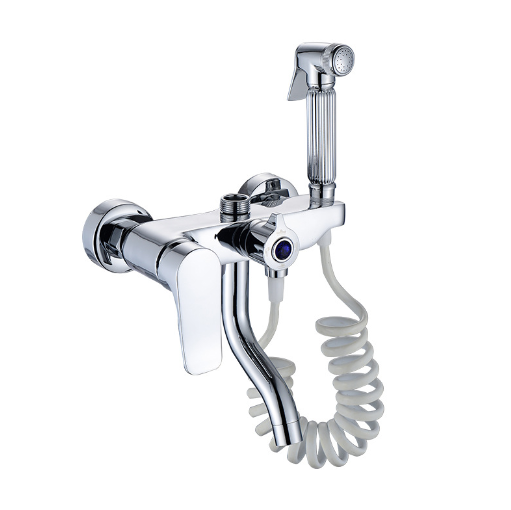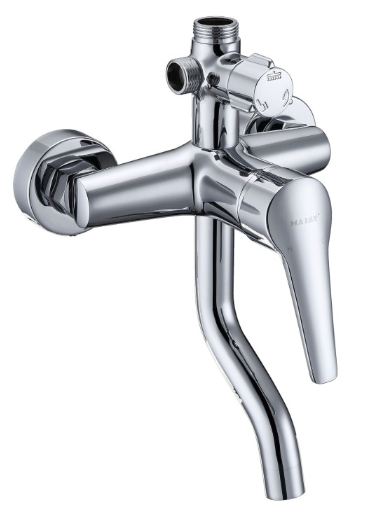Understanding Modern Shower Control Solutions
A shower mixer represents the pinnacle of modern bathroom engineering, combining hot and cold water flows into a perfectly balanced stream for optimal showering comfort. These essential fixtures have revolutionized how we experience our daily showers, offering precise temperature control and consistent water pressure. In commercial settings, from hotels and gyms to hospitals and dormitories, shower mixers have become the go-to solution for reliable and efficient water management.
The Technical Aspects of Shower Mixers
Core Components and Functionality
At the heart of every shower mixer lies sophisticated engineering that ensures seamless water flow control. The main valve body houses precisely crafted components that blend hot and cold water supplies. The thermostatic element responds to temperature fluctuations, automatically adjusting the mix to maintain the desired temperature. Modern shower mixers incorporate pressure-balancing technology, preventing sudden temperature changes when other water outlets are used simultaneously.
The mixing chamber features carefully designed channels that promote optimal water blending while minimizing turbulence. This engineering detail ensures consistent water delivery and prevents temperature fluctuations that could compromise user comfort and safety.
Advanced Safety Features
Commercial-grade shower mixers come equipped with multiple safety mechanisms. The thermostatic control prevents scalding by instantly responding to pressure changes, while built-in temperature limiters can be adjusted to comply with local safety regulations. Anti-scald technology provides an additional layer of protection by automatically shutting off the hot water supply if the cold water fails.
These safety features are particularly crucial in commercial installations where user safety and liability concerns are paramount. The robust construction of commercial shower mixers includes tamper-resistant components and anti-vandal features, ensuring long-term reliability in high-traffic environments.
Commercial Applications and Benefits
Cost-Effective Water Management
In commercial settings, shower mixers prove their worth through significant water and energy savings. The precise temperature control eliminates the need for users to waste water while adjusting to their preferred temperature. Flow regulators integrated into modern shower mixers help maintain optimal water pressure while reducing overall consumption, resulting in substantial utility cost savings over time.
Building managers appreciate the reduced maintenance requirements of quality shower mixers. The durable construction and reliable operation mean fewer service calls and replacement parts, contributing to lower operational costs. Additionally, many models feature easily accessible components for routine maintenance, minimizing downtime during servicing.
Versatility in Commercial Installations
Commercial shower mixers adapt seamlessly to various installation scenarios. Whether in multi-story hotels, sports facilities, or healthcare environments, these fixtures can be configured to meet specific requirements. The ability to handle high-pressure systems and variable water supplies makes them ideal for large-scale projects where consistent performance is essential.
Installation flexibility extends to retrofit projects, where modern shower mixers can often replace older fixtures without major plumbing modifications. This adaptability, combined with their robust construction, makes them a practical choice for facility upgrades and renovations.
Sustainability and Environmental Impact
Water Conservation Features
Modern shower mixers contribute significantly to water conservation efforts. Flow restrictors and aerators reduce water consumption without compromising the shower experience. Some models include eco-stop functions that encourage users to be mindful of their water usage. These features align with green building certifications and environmental regulations, making shower mixers an essential component of sustainable building design.
The precise temperature control also means less water is wasted during temperature adjustment, contributing to overall water savings. In large commercial installations, these savings can amount to thousands of gallons annually, supporting both environmental goals and cost reduction initiatives.

Energy Efficiency Considerations
By optimizing hot water usage, shower mixers help reduce energy consumption associated with water heating. The thermostatic control ensures that only the necessary amount of hot water is used, preventing energy waste from excessive hot water consumption. This efficiency is particularly valuable in commercial settings where hot water demand is high and energy costs are a significant consideration.
Some advanced shower mixer models include energy-saving modes and programmable settings that can be adjusted based on peak usage times or seasonal requirements. These features provide facility managers with additional tools for managing energy consumption effectively.
Installation and Maintenance Guidelines
Professional Installation Requirements
Proper installation of commercial shower mixers requires careful consideration of water pressure, pipe sizing, and system compatibility. Professional installers must ensure proper alignment and sealing to prevent leaks and maintain optimal performance. The installation process includes pressure testing, temperature calibration, and verification of safety features to meet commercial building codes and regulations.
Access panels and service points should be strategically planned during installation to facilitate future maintenance. This forethought helps reduce maintenance costs and minimizes disruption to facility operations when servicing is required.
Ongoing Maintenance Protocols
Regular maintenance of shower mixers in commercial settings involves scheduled inspections, cleaning of filters and aerators, and testing of safety features. Maintenance staff should be trained to recognize early signs of wear or performance issues. Implementing a preventive maintenance program helps extend the life of the fixtures and ensures consistent performance.
Documentation of maintenance activities and performance checks is essential for warranty compliance and facility management records. Many manufacturers provide detailed maintenance guidelines and training resources to support facility maintenance teams.
Frequently Asked Questions
How long do commercial shower mixers typically last?
Commercial shower mixers, when properly maintained, can last 15-20 years or more. The actual lifespan depends on factors such as water quality, usage frequency, and maintenance practices. High-quality units with brass construction and ceramic disc cartridges tend to offer the longest service life.
What makes shower mixers particularly suitable for commercial projects?
Shower mixers excel in commercial applications due to their durability, precise temperature control, safety features, and water-saving capabilities. They can handle high-volume usage, maintain consistent performance under varying conditions, and help reduce operational costs through efficient water and energy management.
Are shower mixers difficult to maintain in commercial settings?
While shower mixers require regular maintenance, their design typically allows for straightforward servicing. Most maintenance tasks involve simple procedures like cleaning filters and checking seals. The key is establishing a regular maintenance schedule and ensuring staff are properly trained in basic upkeep procedures.
What should be considered when selecting shower mixers for a commercial project?
Key considerations include expected usage patterns, water pressure requirements, safety features, energy efficiency ratings, and compliance with local building codes. Other factors include the availability of replacement parts, warranty terms, and the manufacturer's track record in commercial applications.


